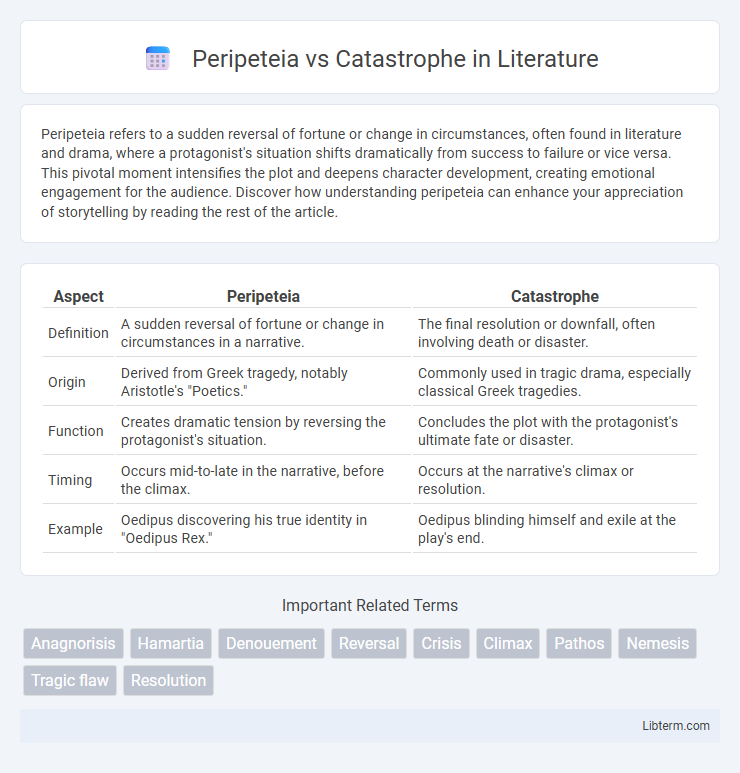Peripeteia refers to a sudden reversal of fortune or change in circumstances, often found in literature and drama, where a protagonist's situation shifts dramatically from success to failure or vice versa. This pivotal moment intensifies the plot and deepens character development, creating emotional engagement for the audience. Discover how understanding peripeteia can enhance your appreciation of storytelling by reading the rest of the article.
Table of Comparison
| Aspect | Peripeteia | Catastrophe |
|---|---|---|
| Definition | A sudden reversal of fortune or change in circumstances in a narrative. | The final resolution or downfall, often involving death or disaster. |
| Origin | Derived from Greek tragedy, notably Aristotle's "Poetics." | Commonly used in tragic drama, especially classical Greek tragedies. |
| Function | Creates dramatic tension by reversing the protagonist's situation. | Concludes the plot with the protagonist's ultimate fate or disaster. |
| Timing | Occurs mid-to-late in the narrative, before the climax. | Occurs at the narrative's climax or resolution. |
| Example | Oedipus discovering his true identity in "Oedipus Rex." | Oedipus blinding himself and exile at the play's end. |
Defining Peripeteia and Catastrophe
Peripeteia refers to a sudden and unexpected reversal of circumstances or fortune in a narrative, marking a pivotal turning point that dramatically shifts the protagonist's trajectory. Catastrophe denotes the final disaster or tragic conclusion in a plot, where the consequences of earlier conflicts culminate in downfall or destruction. Both concepts are essential in classical tragedy, emphasizing transformation and ultimate resolution within the storyline.
Origins in Classical Literature
Peripeteia, originating from Aristotle's "Poetics," refers to a sudden reversal of fortune or change in circumstances within a tragedy, often leading to the protagonist's downfall. Catastrophe, rooted in ancient Greek drama, especially in the works of Sophocles and Euripides, denotes the final resolution or disastrous conclusion of the plot. Both concepts are crucial to classical literature's exploration of fate and character, with peripeteia emphasizing dramatic turning points and catastrophe marking the play's ultimate closure.
Key Differences Between Peripeteia and Catastrophe
Peripeteia is a sudden reversal of fortune or change in circumstances in a narrative, often marking the protagonist's shift from stability to crisis, whereas catastrophe refers to the final resolution or disastrous conclusion of the plot. Peripeteia typically occurs mid-story, driving the tension and character development, while catastrophe happens at the end, delivering the ultimate outcome or downfall. The key difference lies in timing and narrative function: peripeteia triggers the turning point, catastrophe provides closure.
Role in Narrative Structure
Peripeteia marks a sudden reversal of fortune in a narrative, shifting the protagonist's trajectory from stability to crisis or vice versa, serving as a critical turning point that heightens dramatic tension. Catastrophe occurs near the narrative's climax, representing the final downfall or resolution, often culminating in the protagonist's ultimate defeat or the story's thematic closure. Both elements are central to classical tragedy, with peripeteia driving plot momentum and catastrophe delivering emotional and moral resolution.
Examples from Greek Tragedy
Peripeteia, a sudden reversal of fortune often seen in Sophocles' "Oedipus Rex," transforms Oedipus from a respected king to a doomed outcast. Catastrophe, the final disastrous conclusion, is exemplified in Euripides' "Medea," where the protagonist's vengeance culminates in the murder of her own children. These devices intensify the emotional impact and underscore the tragic themes in Greek drama.
Impact on Character Development
Peripeteia marks a critical turning point where the protagonist's fortunes reverse, profoundly shaping their psychological complexity and prompting significant growth or self-realization. Catastrophe, often following peripeteia, results in tragic downfall or destruction, cementing the character's fate and highlighting inherent flaws or fate's inevitability. Both elements drive character development by intensifying conflict and revealing deeper motivations or vulnerabilities within the narrative arc.
Emotional Effects on the Audience
Peripeteia triggers a sudden reversal in the protagonist's fortune, generating shock and heightened emotional engagement by shifting audience expectations dramatically. Catastrophe delivers the final tragic outcome, evoking profound feelings of despair and catharsis as the narrative concludes with irreversible loss. Together, these elements manipulate emotional intensity, deepening the audience's psychological investment and reflective experience.
Modern Interpretations in Literature
Modern interpretations of peripeteia emphasize sudden character revelations that drive plot twists, while catastrophe often symbolizes the profound consequences of those changes, highlighting moral or existential themes. Contemporary literature frequently blurs the lines between peripeteia and catastrophe, using both to explore complex psychological and societal dynamics. These narrative devices deepen reader engagement by creating layered story arcs that challenge traditional notions of fate and free will.
Peripeteia and Catastrophe in Film and Theater
Peripeteia in film and theater refers to a sudden reversal of fortune or change in circumstances, often driving the narrative toward a critical turning point. Catastrophe follows as the final resolution of the plot, typically involving the protagonist's downfall or a tragic conclusion that delivers emotional impact and thematic closure. Both elements are essential in tragic drama, with peripeteia heightening tension and catastrophe providing a powerful, decisive ending.
Why Understanding These Concepts Matters
Understanding peripeteia and catastrophe is essential for analyzing dramatic structure and narrative impact in literature and theater. Recognizing peripeteia, the sudden reversal of fortune, and catastrophe, the final tragic downfall, helps readers and viewers grasp the emotional intensity and thematic resolution of a story. Mastery of these concepts enhances critical interpretation, character development insight, and appreciation of classical and modern storytelling techniques.
Peripeteia Infographic

 libterm.com
libterm.com